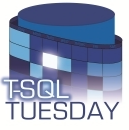
I am the proud host of TSQL Tuesday for the month of November 2018.
My call to post entries is here . I wanted to know from community on what are the non sql server technologies they are dabbling in, to keep up with the rapidly changing data world. This is my own humble contribution to the collection.
I am a math/stats graduate. It has been a good amount of time though since I did anything with what I learned in school for this. I never really thought it would be of any use to me career wise. I’ve always loved math, just never found time or opportunities to play with it further, and definitely not in the IT world. Until now. For the past 5 years there has been a great deal of focus on statistics, machine learning and data science – by companies to put their collection of data to better use. Majority of people really do not know more beyond the buzz words, and few companies are doing data science related work in a serious way. But the increased focus has certainly led to many of us digging out what we knew or renewing our interest in math as related to today. I’ve always also wanted to get back into programming – learning languages like C Sharp or .NET seemed the easiest route to go, but I do not want to discard my two decade DBA experience and plunge headlong into becoming a full time programmer with any of that. I wanted something that I could use to play with data. After the SQL Server integration with R came out – learning R seemed most logical to do. I started learning it by brushing off some of the concepts around statistics that I have known a long time, and learning each of those with appropriate R constructs to go with them. I’ve written several blog posts in this regard. I had to stop blogging on this due to some changes in life but plan to get back to it as soon as i can. What I have gained from learning R –
1 Concepts of statistics and how to apply them to real world data
2 Differences in data constructs outside of relational model
3 Difficulties faced by data scientists/R programmers in implementing their models to run consistently (there are shops converting R code to T-SQL and .NET for this reason).
4 How to provide added value as a DBA to R programmers/data scientists who work at your shop by setting up SQL Server to talk to R, setting up R server, processes to run their code and so on.
I highly encourage anyone who is a DBA and has similar interests as me to try this out, you will not regret it!


